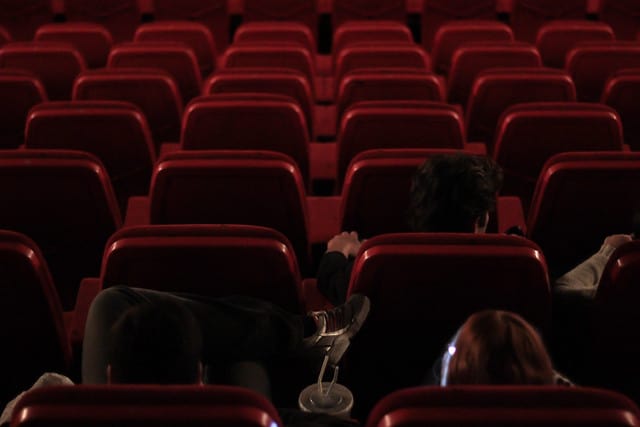Top 20 Most Controversial French Films
Originally published by Molli on August 2019 and updated by Charity K on August 2022 and Updated by Vanessa in May 2023 and updated by Beatrice J in February 2024
I may be known to my closest friends and family as a bookworm, I do love a good film as well. I love a little bit of controversy now and then, too. And, to be honest, give me anything French and I’m a happy girl. So, you can imagine that I was excited to begin working on this article.
Have you ever driven past a car accident, but couldn’t bring yourself to look away from the horrors because you were curious? I think it’s safe to say that as humans, most of us have experienced this feeling.
Most of the films below are hard to watch, but in a “This is difficult…but I can’t look away!” kind of way. I came across a lot I could have included on my list, as it turns out the French are no stranger to controversial movies! But, to keep things simple, I’ve narrowed it down to just a few.
Keep reading for what I think are the top 20 most controversial French films!
Warning: some of the trailers shared below may include graphic images.
1. Belle de Jour (1967)
Belle de Jour, written and directed by Luis Buñuel and starring Catherine Deneuve, tells the story of a woman who feels compelled to become a high end prostitute. The first time I read the premise of this film I couldn’t help but laugh, but it’s technically not a comedy.
The story goes that Séverine (Deneuve), is happily married but feels unsatisfied with her sex life. Her solution? Become a daytime prostitute so that she can live out her fantasies while her unknowing husband is at work. Are you laughing too? If you were feeling unsatisfied in your sex life, would your natural choice be to become a prostitute? I’m going to assume, no.
Despite the obviously 1960s era chauvinistic undertones, the aesthetic of the film are beautiful, and the end is exciting. The plot itself is what makes this film controversial, but the the visuals aren’t as shocking as the others on my list.
2. Love (2015)
Love is a 2015 film written and directed by Gaspar Noé. You may recognize Noé’s name as he has had much success in the film industry, notably winning awards at the Cannes Film Festival for his other films I Stand Alone and Climax.
Love is about a couple living in Paris: Murphy and Electra. Murphy is an American film student and Electra is his French girlfriend. One day, the couple meets another woman, named Omi, and decide to have a threesome with her in order to spice up their sex life.
I won’t spoil the entire story for you, but I will say that most of the film is filled with Murphy’s flashbacks of his relationship with Electra and Omi. So, what makes this film controversial? The three had a taste for sex, partying and drug use, and the images can be intense at times. According to Noé, many of the sex scenes were unstimulated as well. How’s that for controversial?
3. Blue is the Warmest Color (2013)
I remember when Blue is the Warmest Color first came out in 2013, I went to see it in theatres and I absolutely loved it. This coming of age drama stars Léa Seydoux and Adèle Exarchopoulos, two actresses that you should start watching as soon as you finish this article.
Written and directed by Abdellatif Kechiche, the film follows the story of Adèle, a high school student that falls in love with a painter named Emma. The story itself is controversial as it graphically depicts sex scenes between the two female characters. But, many critics say that rather than focusing on real relationships between women, it focuses too much on a straight man’s depiction of what lesbian romance entails.
Before the film was released, there was also controversy surrounding Kechiche’s methods. Apparently, everyone involved in the film experienced harsh working conditions, which including working long hours and receiving harassment from the director. Both Seydoux and Exarchopoulos have said that is was “horrible” working with him, but were overall happy with the film and don’t regret the experience.
4. Beau-père (1981)
This film is probably the…softest on my list, as it doesn’t have any graphic, violent or explicit sex scenes. That being said, the subject of Beau-père is quite controversial.
The film stars Patrick Dewaere and Ariel Besse, and was written and directed by Bertrand Blier. Blier actually based the film on a novel of the same name that he had written years before. It tells the story of a 30 year old man, Rémi, that falls in love with his 14 year old stepdaughter, Marion, after her mother is killed in a car crash.
Marion falls in love with Rémi and begins to make sexual advances towards him, despite her age. The film is obviously controversial for this reason, as the two characters become more and more intimate as the film progresses. There are some definite Lolita by Vladamir Nabokov vibes. You’ve been warned!
5. Baise-moi (2000)
This could be the most controversial film on my list for the title alone: Baise-moi can translate as Rape Me, although the directors have rejected this translation. Baiser in French can also mean to kiss, or to have sex, which is a fairer translation.
Baise-moi was written and directed by Virginie Despentes and Coralie Trinh Thi, and is based on a novel by Despentes. It is considered to be a revenge story, and after you watch, you’ll see why. The film features explicit sex scenes and a lot of violence, which is why it is on my list.
The film tells the story of Nadine and Manu, both women involved in sex-work. The pair are extremely violent, and decide go on a rampage to get revenge for various things that have happened to them.
Baise-moi is banned in many countries across the world including Malaysia, Singapore, and until very recently, Australia.
6. Romance (1999)
Romance, written and directed by Catherine Breillat, is an arthouse film that was released in 1999. Arthouse refers to films that are meant for niche markets, rather than mainstream audiences. The film is considered controversial, mainly because of the unstimulated sex scenes between the actors. Arthouse films are usually not strangers to controversy.
The story is about a woman named Marie that is in an unhappy relationship with her boyfriend. She decides to leave him in the pursuit of casual and intense sex with strangers. Marie eventually meets a man named Paolo, and the film follows her story. The end of the movie is pretty difficult to watch, but I’ll let you all see that for yourselves.
If it feels like all of these films have to do with adventurous sex, it’s because it’s true. I guess that’s what it takes to be a controversial French film!
7. Fat Girl (2001)
Fat Girl is another film written and directed by Catherine Breillat, only this time it’s a little less arthouse-y. But, that doesn’t mean it’s not controversial all the same!
The story follows 2 sisters, Anaïs and Elena. Elena is older, attractive and plans to save herself for her first true love. Anaïs is younger, heavy set, and is determined to lose her virginity to someone she doesn’t care about.
The film follows their adventures through a seaside town during their summer vacation. The ending is absolutely insane and unexpected, so definitely watch it all the day through to see what happens.
Controversy surrounded the film after its release, especially in Ontario, Canada. It was banned completely in Ontario, and was restricted to adult audiences elsewhere in Canada and around the world. The ban was eventually lifted in 2003.
8. The Battle of Algiers

Photo by Wikimedia Commons – Wikimedia
We now start moving into a more contentious era of French censorship. The Battle of Algiers is cited as one of the greatest war films of all time, but it was banned from its release in 1966 until the early 1970s.
Italian director Gillo Pontecorvo was at pains to show both sides of the French-Algerian conflict during the Algerian War of Independence, but the film was still labeled as an unfair depiction of the French forces.
The international reputation of the film, however, remained untarnished, with the movie picking up several Academy Award nominations and winning the Golden Lion at Venice Film Festival.
9. Path of Glory

Photo by Wikimedia Commons – Wikimedia
Another war film, this time by Stanley Kubrick and starring Hollywood legend Kirk Douglas, and another one that the French objected to despite international acclaim for the movie itself.
This time around, it was the critical depiction of the French during World War I that caused issues for the authorities. Douglas stars as Colonel Dax, a man whose French charges refuse to undertake a suicidal attack and end up being court-martialled.
Both serving and retired military officials in France put pressure on the film’s European distributors to not release it, and during its time on the banned list, it was even prevented from being screened at American army bases.
10. Carmen Jones

Photo by Wikimedia Commons – Wikimedia
The charming American musical from 1954 is a firm favorite of anyone keen on the genre. You would be hard-pressed to find anything offensive in it at all, and the whole film feels like a perfect example of the Golden Age of Hollywood.
There was, however, an unfortunate copyright issue with the estate of the composer Georges Bizet (who penned the opera, Carmen, on which this film is based on). The problem was eventually resolved, but it took almost thirty years to get it all sorted.
11. Le Corbeau
The film was perceived by the resistance movement as vilifying the native population, and the director was banned from making movies (although this was short-lived).
The remake, titled The 13th Letter, was released only a few years later and directed by Otto Preminger, who would go on to make the aforementioned Carmen Jones.
12. Battleship Potemkin

Photo by Wikimedia Commons – Wikimedia
One of the most celebrated films of all time and often singled out for its revolutionary filmmaking techniques, this Russian epic was banned over fears it would inspire a revolution itself.
Authorities in France eventually relented in 1953, some 20 odd years after the rest of the world first saw it.
13. Antichrist
Lars von Trier is no stranger to controversy (his realistic depictions of sex on screen have long been a sticking point for censors around the world), but initially, this Cannes favorite was given the green light when it was released in 2009.
The Danish-produced film stars Willem Dafoe and Charlotte Gainsbourg and the story lingers on the rapidly degenerating relationship between a couple who lose a child in the most devastating of ways.
14. Lost River

Photo by Wikimedia Commons – Wikimedia
Poor Ryan Gosling hasn’t had the best luck when it comes to Cannes, with his 2013 movie Only God Forgives being heavily criticized before his directorial debut was slammed just one year later.
The 2014 film is a mix of Nicolas Winding Refn and David Lynch following a single mother who is led into a dark underworld whilst her son simultaneously discovers an underwater land.
Starring Saoirse Ronan, Matt Smith, and Eva Mendes, the film was met with tremendous negativity, including mass booing and a considerable amount of walkouts at its Cannes premiere.
15. Taxi Driver

Photo by Wikimedia Commons – Wikimedia
Remarkably, the iconic Martin Scorsese movie Taxi Driver starring Robert De Niro, Harvey Keitel, and Jodie Foster was booed at the Cannes Film Festival in 1976.
Not only was it jeered and loudly booed for its violent conclusion, but several audience members also walked out of the screening, with the movie gaining a notorious reputation for its shocking gore.
Several crew members for the film even reported that they didn’t feel particularly comfortable walking around the festival due to the film’s reputation, though this didn’t stop the film from picking up the Palme d’Or.
16. Baise-Moi
Cinema owners must have been reluctant to promote a movie that used the equivalent of the F-Word in its title because of the title itself, which was obviously a real problem.
In the story of rape and retaliation, two women take up arms against a world that has tortured them for most of their lives. It is blatantly violent, with different titles for the film in some locales that translate to “Rape Me.” The general notion is clear. Baise-Moi had to wait an additional year before a more stringent classification was issued since the French X-Rating was thought to be too mild when the movie was first released in 2000.
17. The Texas Chainsaw Massacre
This influential horror picture from 1974 is still a gruesome and scary prequel to the slasher films that would come after. In a complex plot, a group of teenagers travelling in a camper van run into a variety of terrifying characters, including Leatherface, the symbol of terror.
Given the bloody horror films that have come out of France in recent years, it’s remarkable that the movie still can’t be screened. In fact, those are the very reasons provided for the ban in the first place. The movie is violent and cruel.
18. Carmen Jones
Any fan of the genre would vouch for the delightful American musical from 1954. It would be difficult to find anything unpleasant in it at all, and the entire movie feels like a great representation of Hollywood’s Golden Age.
But, there was a terrible copyright issue with the estate of composer Georges Bizet (who penned the opera, Carmen, which this film is based on). It took almost thirty years to get everything sorted out, but the issue was eventually fixed.
19. La Dolce Vita
Federico Fellini’s brilliant comedy, which follows the raunchy antics of a tabloid journalist floating around Rome created a lot of controversy in France. In the director’s country of origin, Italy, La Dolce Vita had already achieved success.
The Catholic Church scorned the film because of its sinful, pleasure-seeking culture. The film’s opening scene, in which a helicopter flies a statue of Christ over Rome to the wonder and enjoyment of people below, offended the conservative Catholics.
20. The House That Jack Built (Lars von Trier, 2018)
The House That Jack Built, directed by Lars von Trier and starring Matt Dillon, Bruno Ganz, and Uma Thurman, cannot be ignored given that it appears in both of the entries. Since it follows a cruel serial murderer over the course of 12 years, von Trier’s film is willing to show the full depth of Jack’s murderous tendencies, with scenes portraying the main character shooting two toddlers in the head and chopping off a woman’s breast.
In response to criticism from the audience at the time that the film was “vile” and “disgusting,” 100 individuals left the showing.
I hope I haven’t scared you away from French cinema with this list of the top 20 most controversial French films! However, if you’re anything like me, you’ll walk away from this article feeling intrigued.
Have you ever found yourself sitting in front of Netflix, or your television, without a clue in the world what to watch?! Save this blog for the next time you find yourself in that position!
If you want to discuss French cinema with a real, live, French person, why not sign up for one of our walking tours in Paris? All of our guides are locals, and I’m sure they’ll be able to tell you even more about French films than I just did! Click here to learn more.
Planning a trip to Paris ? Get ready !
These are Amazon’s best-selling travel products that you may need for coming to Paris.
Bookstore
- The best travel book : Rick Steves – Paris 2023 – Learn more here
- Fodor’s Paris 2024 – Learn more here
Travel Gear
- Venture Pal Lightweight Backpack – Learn more here
- Samsonite Winfield 2 28″ Luggage – Learn more here
- Swig Savvy’s Stainless Steel Insulated Water Bottle – Learn more here
Check Amazon’s best-seller list for the most popular travel accessories. We sometimes read this list just to find out what new travel products people are buying.












